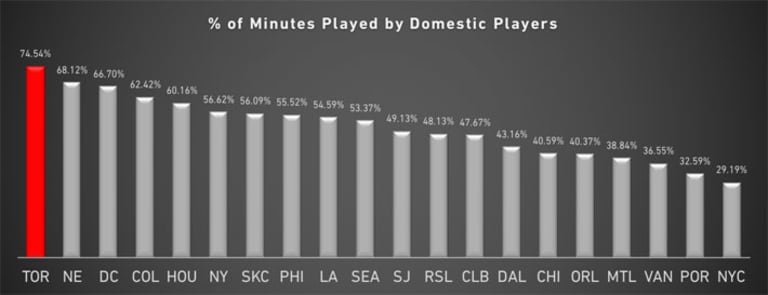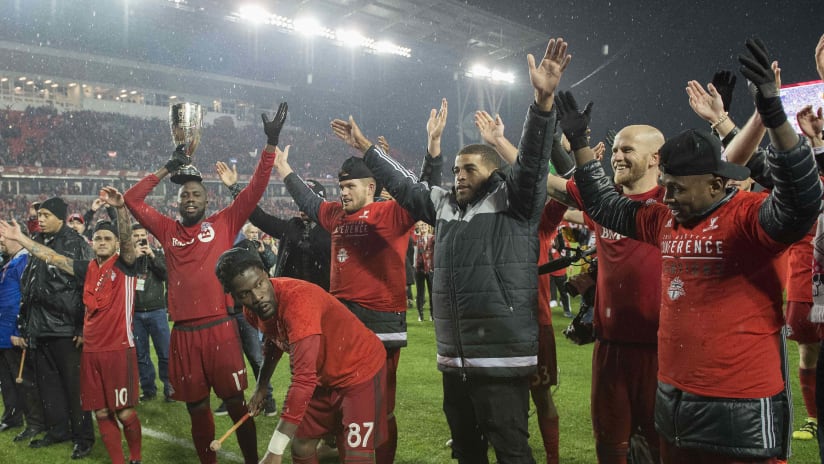Over the past decade, during the era of Designated Players and rapid expansion and the advent of the Homegrown system and just generally the growing profile of the sport in the US and Canada, MLS has become a less "domestic" league. There are more imported European superstars like David Villa or Sebastian Giovinco, and there are more potential-filled young-ish players from Latin America like Miguel Almiron and Lucho Acosta, and there are even more high-level imports coming through the SuperDraft -- Jack Harrison, Joshua Yaro, Omar Holness, Fabian Herbers and Tsubasa Endoh just from the 2016 version of that event.
I'm of the opinion that this is fine. Even as the percentage of minutes played by domestics drops the total number continues to rise, and I suspect that as more and more academy products come on line, the "percentage" part will eventually rebound to something close to what it was at the start of the decade. After all, if you can build a Jordan Morris or an Alex Muyl or a Kellyn Acosta, why buy one?
Others are more skeptical, and tend to couch this trend as a failure of domestic youth products, as well as domestic developmental systems. I think they're wrong, but that's a column for a different day.
Regardless, over the last seven seasons, the total share of minutes going to domestic players has dropped from a tick above 60 percent to just under 54 percent:
Year |
Total minutes |
American minutes |
Canadian minutes |
% Total domestic minutes |
|---|---|---|---|---|
2016 |
670,951 |
340,303 |
19,715 |
53.66% |
2015 |
671,714 |
339,346 |
16,716 |
53.01% |
2014 |
637,465 |
341,468 |
18,367 |
56.45% |
2013 |
636,809 |
342,426 |
19,336 |
56.81% |
2012 |
637,554 |
334,390 |
21,924 |
55.89% |
2011 |
603,441 |
338,948 |
20,835 |
59.62% |
2010 |
473,316 |
263,698 |
21,333 |
60.22% |
(For the purposes of the below argument we're using the Opta database, so guys like Steven Beitashour and Justin Meram -- Americans who are cap-tied to other nations -- don't count as domestic.)
One team, however, has bucked the trend in a huge way over the past couple of seasons. Toronto FC have what is arguably the best academy in the league, which produces regular, local contributors all over the field; and they value the draft, which has provided them with guys like Nick Hagglund and Alex Bono; and they have shopped for league veterans in crucial roles, like Drew Moor, Clint Irwin and Will Johnson; and when they have looked to sign players from abroad to strengthen their roster, they've still managed to mostly shop local, as the presence of Jozy Altidore, Michael Bradley and Tosaint Ricketts will attest.
In all likelihood, there will be only three non-domestic starters for TFC on the field this Saturday in MLS Cup (8 pm ET; Fox & Unimas in the US | TSN 1/3/4 & RDS in Canada), a number that drops to two depending upon how you view Beitashour's developmental path. On top of that, there will probably be just one other import in the gameday 18.
This is not out of line with how they've constructed their team over the course of the season, and the numbers show it:

There is no one perfect way to build an MLS team, and there is nothing inherently more righteous about winning with domestic talent than with imports. Portland's MLS Cup trophy from 2015 counts just as much as the one that'll be handed out on Saturday, whether it's to TFC or Seattle.
But context is important, and precedent is important, and sustainability is important. And given all that, it feels very much like the Reds are in the process of carving a path forward that other teams around the league will want to follow, while reinforcing the notion that you can most definitely compete for silverware by fielding a team primarily comprising Americans and Canadians.













